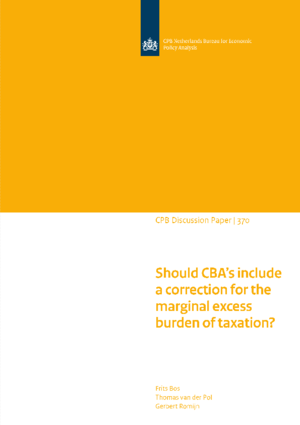Should CBA’s include a correction for the marginal excess burden of taxation?
It argues that in general the best approach for CBA’s is to assume that the MEB is broadly counterbalanced by the benefits of redistribution of these taxes. This assumption is consistent with the preferences for equality in a country’s current tax system and is a simple, pragmatic and politically neutral assumption. This assumption does not imply that the tax system is optimal or that CBA’s should be distributionally weighted. As a consequence, the preferred approach is to assume in general that the marginal cost of public funds is equal to one and then no correction is needed in CBAs for the MEB. Choosing an alternative source of financing, i.e. other than general tax revenues, should be regarded as a separate policy measure that should be analysed separately in a CBA.

